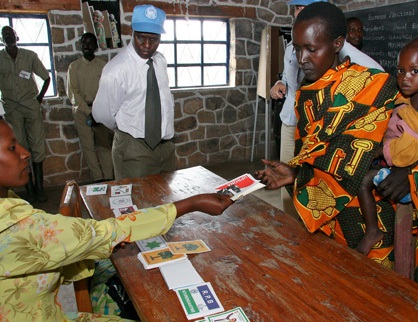
The violent presidential election in Burundi highlights the need for UN election-monitoring services. On the eve of the July 21st presidential election, Taye-Brook Zerihoun, UN Assistant Secretary-General for Political Affairs warded that “The grave danger the country faces should not be underestimated, given the increasing polarization and the apparent choice of Burundian leaders to put personal interest before those of the country.”
Since April, when President Pierre Nkurunziza announced that he was seeking a third term as president, there has been violence: street demonstrations have been met with military and police repression, in May there was a failed coup d’état led by high-ranking military officers; and nearly 200,000 persons have fled the country fearing the growth of violent actions.
Some observers feared that the tensions could lead to ethnic divisions which have always been an important factor in Burundi politics. Since coming to power in 2005 after a period of ethnic violence, Pierre Nkurunziza has kept relative calm in the country, but there has not been a nation-wide increase in socio-economic welfare. A few persons close to the political leaders have made money but this has only increased social tensions.
In the July 21st election, Nkurunziza received some 70% of the votes; his long-time rival Agathon Rwasa some 19%. It was impossible to organize a nation-wide opposition. There are 17 groupings which call themselves “political parties,” but none has a national audience. There was no debate on issues, and the media is under the control of the President. The President has rivals within his own political grouping. The failed coup was led by military officers who had been close to the President.
The conditions of the election highlight the need for a professional corps of election observers. It is not enough to have observers during the polling, but they must be there during the election campaign itself and in the immediate post-election period during which street violence may break out. Citizens of the World have often called for international, basically UN supervision, of elections. The organization of elections remains a prerogative national and local government. However, in cases where the election campaign can be tense and prone to violence or when there has been a past history of fraud, international, independent monitors are important agents of fair elections and help to protect human rights, to strengthen the rule of law and to ensure pluralistic democracy.
Election observation work is an important activity for the 56 member States of the Organization for Security and Cooperation in Europe (OSCE) and its Office for Democratic Institutions and Human Rights housed in Warsaw, Poland. The Office for Democratic Institutions, originally called the Office for Free Elections, first played an important role in the democratic transition in post-communist countries. While its observation of elections is its most visible task, the Office also conducts a number of other useful election-related activities: reviewing electoral legislation, training observers, and publishing guidelines and handbooks about electoral issues.
The Office for Democratic Institutions has a holistic approach to election monitoring including the following:
-Respect for basic fundamental freedoms such as the freedom of assembly, of association, and expression;
-Respect for the civil and political rights of the candidates and voters;
-Compilation of accurate voter lists;
-Equal opportunities to campaign in a free environment;
-Equitable access to the media;
-Impartial election administrative bodies;
-Unhindered access for international and domestic election observers;
-Effective representation and participation of women:
-Effective representation of national minorities;
-Access for disabled voters;
-Honest and transparent counting and tabulation of the votes;
-Effective complaints and appeals process with an independent judiciary.
Electoral fraud is rarely at the counting stage. One can recount a stuffed box and come up with the same number of votes. This is why the whole electoral process needs to be monitored by independent election agents.
The United Nations has no comparable permanent election monitoring office, but on an ad hoc basis the UN played an important monitoring role in the first multi-racial elections in South Africa as well as the first post-conflict elections in Cambodia in 1993. The Office of the High Commissioner for Human Rights has provided election aid and monitoring in countries such as Nepal as that country was coming out of a decade of armed violence.
The current UN-based election-monitoring services need to be strengthened. The UN General Assembly should mandate a study on the means by which the UN could provide a universal election-monitoring service drawing upon the rich experience of the OSCE.
Rene Wadlow, President and a Representative to the UN, Geneva, Association of World Citizens.
